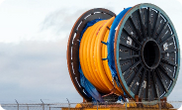Different types of optical fiber cable available — A comparison

Fiberoptic cable is the go-to cable for fast transmission of huge loads of data. That’s why the most common application of fiber optic cables is Internet lines. But with so many fiber optic cable types, how do you choose the right one? Keep reading to learn about various kinds of fiber optics wiring.
Optic cables of different modes
Fiber optic cabling can be of 2 types — singlemode and multimode cables. Let’s discuss the details of each to see the differences between the two.
Singlemode fiber optic cables
Singlemode fiber optics cable features a single pulse path and a small core, which is 8-9 µm. This cable mode is the most suitable for longer networks where higher data transmission speed is needed. Depending on their construction, the singlemode cables can be divided into 2 types, Optical Singlemode 1 and 2 (OS1 and OS2, respectively).
OS1, or Tight buffered cable
The OS1 fiber optic wire is also known as the Tight Buffered Cable. The fibers it features consist of 2 layers, plastic and waterproof acrylate. This cable is lightweight, flexible and can withstand mechanical damage.
The target applications of this cable are residential, business and industrial point-to-point links. In particular, tight-buffered installation, like inside buildings, is the best fit.
OS2, or Loose tube cable
The OS2 fiber optic wire is also referred to as the Loose Tube Cable because of the cable’s construction. There are from 12 to 200 fibers in this wire that are bare and only feature an outer coating, which makes the fibers float in a loose tube. The tube protects the wire from moisture and abrasion.
This fiber cable is an outdoor wire, which means that it is designed for outdoor installation sites. In addition, direct burial along railroads and streets is also allowed.
Multimode fiber optic cables
Multimode fiber optic wiring implies that there are several light paths in the core of the cable. Usually, this kind of fiber optic HDMI cable is used for short to medium networks, such as data centers. When this cable is used for longer data transmission paths, errors and losses in data quality can take place.
Multimode fiber optics can be divided into 5 categories, namely OM1 through OM5. The OM stands for optic multimode. Cables in this category feature a core of 50 µm or 62.5 µm.
OM1
OM1 is one of the oldest and weakest fiber optic HDMI cables in terms of performance. It features an orange jacket and can be run for up to 300 meters. So the target applications of this wire are short networks, which can be both LANs (Local Area Networks) or private.
OM2
The OM2 fiber optic line is one of the weakest in the range, too — just like OM1, it features an orange jacket and transmits 1 Gb at 850 nm wavelength. However, it can run up to 600 meters, hence being able to handle networks of longer distances than OM2.
OM3
While OM3 handles distances of up to 300 meters, it can transmit 10 Gb at the same wavelength as OM2. Besides, using fiber optic connectors can enable the cable to run 40 or 100 Gb, yet for shorter distances. The top target application for this wire is larger private networks.
OM4
Both OM3 and OM4 have an aqua jacket and are best for high-speed networks and data centers. This fiber optic HDMI wire offers the same data transmission capabilities as OM3 but can run up to 550 meters and handle 100 Gb when powered by a connector.
OM5
OM5, among all, is the most revolutionary wire because it offers unique capabilities that meet the modern day’s needs. While fully compatible with OM3 and OM4, it can transmit 40 and 10 Gb per second and is used in data centers and high-speed networks. The jacket of OM5 is green.
Where to buy fiber optic cables?
Nassau National Cable is a fiber optic products supplier that offers an extensive product range of fiberoptic cable options. If you struggle to find the right wire for your project, contact us and we will help you find the right product.

















